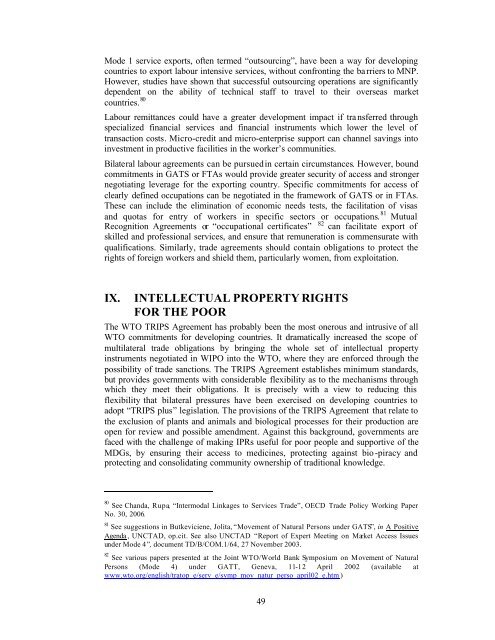Trade Policy Note Final-rev08 - Development
Trade Policy Note Final-rev08 - Development
Trade Policy Note Final-rev08 - Development
Create successful ePaper yourself
Turn your PDF publications into a flip-book with our unique Google optimized e-Paper software.
Mode 1 service exports, often termed “outsourcing”, have been a way for developing<br />
countries to export labour intensive services, without confronting the ba rriers to MNP.<br />
However, studies have shown that successful outsourcing operations are significantly<br />
dependent on the ability of technical staff to travel to their overseas market<br />
countries. 80<br />
Labour remittances could have a greater development impact if tra nsferred through<br />
specialized financial services and financial instruments which lower the level of<br />
transaction costs. Micro-credit and micro-enterprise support can channel savings into<br />
investment in productive facilities in the worker’s communities.<br />
Bilateral labour agreements can be pursued in certain circumstances. However, bound<br />
commitments in GATS or FTAs would provide greater security of access and stronger<br />
negotiating leverage for the exporting country. Specific commitments for access of<br />
clearly defined occupations can be negotiated in the framework of GATS or in FTAs.<br />
These can include the elimination of economic needs tests, the facilitation of visas<br />
and quotas for entry of workers in specific sectors or occupations. 81 Mutual<br />
Recognition Agreements or “occupational certificates” 82 can facilitate export of<br />
skilled and professional services, and ensure that remuneration is commensurate with<br />
qualifications. Similarly, trade agreements should contain obligations to protect the<br />
rights of foreign workers and shield them, particularly women, from exploitation.<br />
IX.<br />
INTELLECTUAL PROPERTY RIGHTS<br />
FOR THE POOR<br />
The WTO TRIPS Agreement has probably been the most onerous and intrusive of all<br />
WTO commitments for developing countries. It dramatically increased the scope of<br />
multilateral trade obligations by bringing the whole set of intellectual property<br />
instruments negotiated in WIPO into the WTO, where they are enforced through the<br />
possibility of trade sanctions. The TRIPS Agreement establishes minimum standards,<br />
but provides governments with considerable flexibility as to the mechanisms through<br />
which they meet their obligations. It is precisely with a view to reducing this<br />
flexibility that bilateral pressures have been exercised on developing countries to<br />
adopt “TRIPS plus” legislation. The provisions of the TRIPS Agreement that relate to<br />
the exclusion of plants and animals and biological processes for their production are<br />
open for review and possible amendment. Against this background, governments are<br />
faced with the challenge of making IPRs useful for poor people and supportive of the<br />
MDGs, by ensuring their access to medicines, protecting against bio -piracy and<br />
protecting and consolidating community ownership of traditional knowledge.<br />
80 See Chanda, Rupa, “Intermodal Linkages to Services <strong>Trade</strong>”, OECD <strong>Trade</strong> <strong>Policy</strong> Working Paper<br />
No. 30, 2006.<br />
81 See suggestions in Butkeviciene, Jolita, “Movement of Natural Persons under GATS”, in A Positive<br />
Agenda , UNCTAD, op.cit. See also UNCTAD “Report of Expert Meeting on Market Access Issues<br />
under Mode 4”, document TD/B/COM.1/64, 27 November 2003.<br />
82 See various papers presented at the Joint WTO/World Bank Symposium on Movement of Natural<br />
Persons (Mode 4) under GATT, Geneva, 11-12 April 2002 (available at<br />
www.wto.org/english/tratop_e/serv_e/symp_mov_natur_perso_april02_e.htm )<br />
49
















